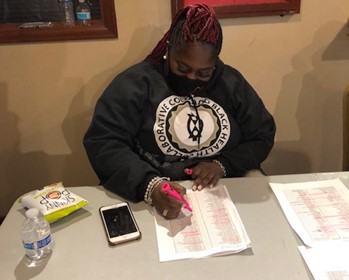
News reports abound citing the vaccine hesitancy among Black Americans. Collectively this reluctance to get the vaccine is based on historical mistrust of the health care system, concern about the vaccines themselves, and fear of the long-term effects.
However, on the Saturday before Valentine’s Day, the day of love, nearly 700 of our community members braved the bitter cold to get jabbed at the New Hope Baptist Church Vaccination Event. New Hope served as the host to a partner site for University of Colorado (UC) Health who helped coordinate the event and administer the Pfizer vaccine. Colorado Black Health Collaborative (CBHC) and its great volunteers chipped in to help recruit and schedule appointments for participants. The CBHC Health Access Committee also participated on the day of the event, performing various functions.
This event for those 65 years of age and older, was intentionally held in a trusted space with people that the community trusts. We saw seniors stepping high, some in wheelchairs and others using walkers. Some folks wore fur coats and fancy hats. Whether plain or fancy, everyone wore a mask. Some people came alone while others were accompanied by family or friends. The event proved to be a veritable family reunion as people recognized a familiar voice or telling eyes of friends they had not seen in a while. It was a wonderful sight to see– so many Black people taking this vaccine that gives us hope to get back closer to life as we knew it. Health systems and the local government are planning to tap other trusted resources and locations to help ensure that the Black community will not be the last to get the COVID-19 vaccine.
About the COVID-19 Vaccines
At this point, two vaccines have been approved to vaccinate against COVID-19. Both use mRNA technology. Read COVID-19 Vaccine, Not a Modern Day Tuskegee Experiment – Dr.TeaNT to find out more how these vaccines work.
We have included a few answers to questions that have come to our attention over the past few months. You can get additional answers to your questions at the CDC website, Frequently Asked Questions about COVID-19 Vaccination | CDC.
Questions
Question: Does the immunity you get from having COVID-19 infection last longer than from getting the COVID-19 Vaccine?
Answer: The protection you get from having an infection (called natural immunity) varies depending on the disease, and it varies from person to person. Since this virus is new, we don’t know how long natural immunity might last. Current evidence suggests that reinfection with the virus that causes COVID-19 is uncommon in the 90 days after initial infection.
Regarding vaccination, we won’t know how long immunity lasts at this point, but researchers are continuing to monitor and gather data on this important issue. Scientist do believe that the immunity from the vaccine will last longer and be more robust than natural immunity.
Both natural immunity and vaccine-induced immunity are important aspects of COVID-19 that experts are trying to learn more about. The Center for Disease Control (CDC) will keep the public informed as new evidence becomes available.
Question: What percentage of the population needs to get the COVID-19 vaccine to have herd immunity to COVID-19?
Answer: Dr. Fauci says we need about 70-85% of the U.S. population to be vaccinated against COVID-19 to achieve herd immunity. There are 330 million Americans, so we have a long way to go.
The fact is that we do not know exactly what percentage of people would need to get vaccinated to achieve herd immunity to COVID-19. We do have to rely on expert opinions like Dr Fauci’s right now. Herd immunity describes when enough people have protection either from past infection or vaccination—that it is unlikely a virus or bacteria can spread, causing disease. As a result, everyone within the community is protected even if some people don’t have any protection themselves.
Question: Can the COVID-19 mRNA vaccines give someone COVID-19?
Answer: These mRNA vaccines don’t cause COVID-19 infection. The mRNA only lasts a short time in the body and does not affect DNA or change your genes. These vaccines do not use the live virus that causes COVID-19. No virus is injected into the body. The mRNA is basically the instruction manual that tells the body to develop the spike protein, which then activates the body’s immune system against COVID-19.
Question: If I have an egg allergy can I take the COVID-19 vaccine?
Answer: You can take the COVID-19 vaccine if you have egg allergy. The mRNA vaccines that are currently available do not contain eggs, preservatives, or latex. People with other food allergies can take the COVID-19 vaccine as well
Question: Are they giving Black People an inferior or different version of the COVID-19 vaccine?
Answer: Black Americans have been and will continue getting the same safe and effective COVID-19 vaccine that other U.S. populations have received. Distribution of the vaccine to vulnerable populations including Black people has been a concern since vaccinations began. In many states, the vaccinations of Blacks have lagged behind. Health systems and governmental entities have developed some strategies to address these inequities.
Have other questions? Please drop us a line @ [email protected].


